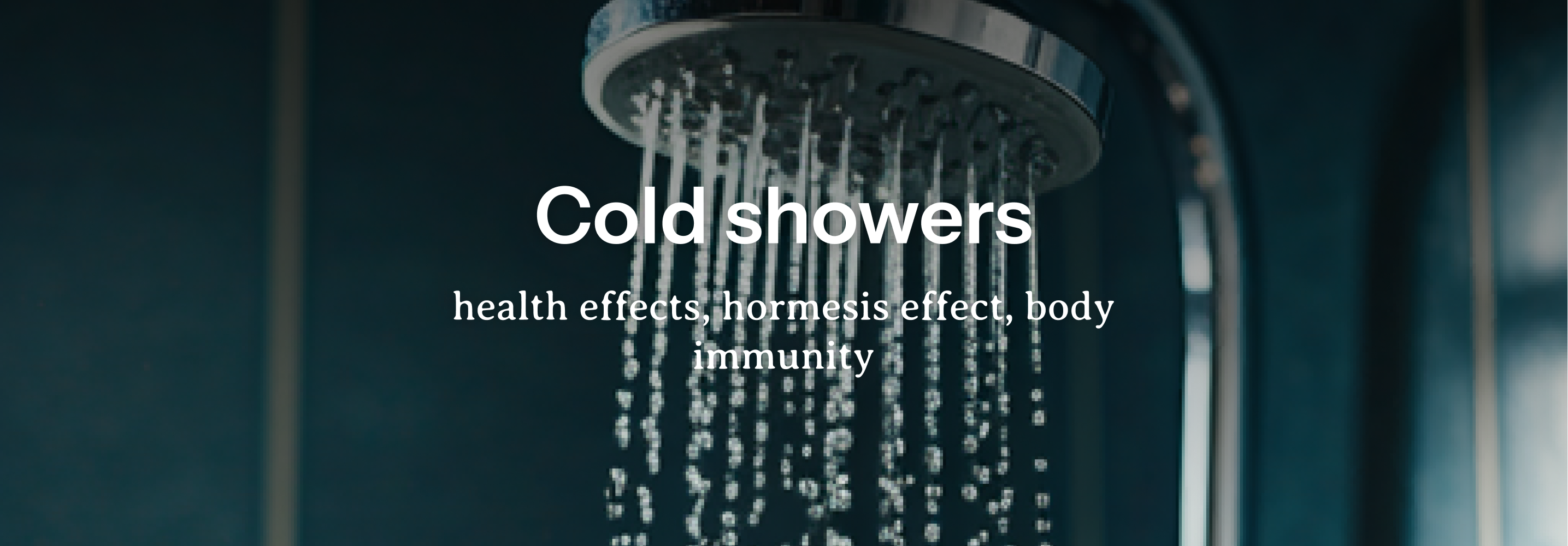
Cold showers - health effects, hormesis effect, body immunity
Cold showers and baths appear in medical, popular science, and even pop culture sources. Various people from both the scientific world and beyond (even some athletes, travelers, and celebrities) recommend the use of this type of hydrotherapy. They talk about a wide range of effects, but what is the reality?
Hormesis
This is a term referring to phenomena or substances that are harmful to humans in large doses, but have a beneficial effect in small doses. This can be described as the popular "what doesn't kill you makes you stronger". In simple terms, a small, controlled dose can stimulate the body's systems to function, improving its functioning. In relation to the immune system, the simplest example is the action of vaccines (dead or weakened pathogenic organisms found in vaccines cause the body to develop immunity, whereas if live pathogens were to enter it, they would cause a disease, e.g. measles). It is assumed that cold showers or baths, in controlled amounts, contribute to improving immunity. Contact with cold causes the activation of the nervous functions of the sympathetic and parasympathetic systems.
Adaptation to oxidative stress
The human body has many defense mechanisms, one of which is the destruction of threats with free radicals. You can hear from all sides that free radicals are harmful and this is partly true - they can counteract pathogenic factors, but when there are too many of them, there can be wide-ranging negative effects. Oxidative stress is a situation when the balance between the amount of reactive oxygen species and the possibility of their reduction is disturbed. This is important in the development of various diseases, for example atherosclerosis, Alzheimer's disease. Cold showers can contribute to the increase in the body's adaptation to oxidative stress. This means that its ability to resist the destructive effects of free oxygen radicals is improved. In addition, the production of glutathione, which is one of the strongest antioxidants, increases.
Effect on blood vessels, analgesic effect
Low temperature causes the subcutaneous tissue and blood vessels to contract (narrow). This is a reflex action that prevents the body from losing heat. Nerve conduction and the release of pain mediators are reduced. The next phase of the cold response is the return of vasodilation and increased blood supply to the skin, which increases blood flow in this way, raising the temperature. It can therefore be concluded that cold showers have an analgesic effect and also have a beneficial effect on the circulatory system.
Regeneration after exercise – the latest scientific research
In April 2018, a meta-analysis of the effects of various regeneration methods on the body was published in the journal Frontiers in Physiology . This is the most accurate research method, based on the analysis of previous publications, in this case over 70 years. 10 of the most popular regeneration methods were compared, including cold water immersion ( it can be assumed that a cold shower may act to some extent like full immersion) and cold-warm showers ( contrast water therapy ). In the case of cold water, a significant effect was noted on the decrease in perceived fatigue, especially after intense effort (e.g. after competitions, rivalries) and a reduction in DOMS (delayed onset muscle soreness, popularly interpreted as soreness, occurring about a day after exercise). Alternating the use of cold and warm water affected muscle soreness, but not fatigue. Another beneficial observation was a decrease in blood creatine kinase levels (which measures muscle breakdown) and a reduction in pain.
"We all have the power to heal - an inner doctor, we just forgot about it"
A figure worth mentioning in connection with the topic of cold is Wim Hof, known as the "Iceman". At the age of 7, he fell asleep in the snow, which caused him to suffer hypothermia, and this event affected his life - a few years later, as he himself says, feeling an inner need, he began to swim in cold water, walk barefoot in the snow, and did things that normally lead to hypothermia or hypothermia. In 2007, he attempted to climb Mount Everest wearing only shorts, and ended the climb at an altitude of 7,400 m above sea level due to an injury. Four years later, tests showed that he was able to control his nervous and immune systems, and he claimed that it was all thanks to meditation and concentration. He currently has thousands of fans around the world trying to imitate his way of "healthy living". This method focuses on three factors: breathing control, meditation, and the discussed exposure to cold.
There are hypotheses about the beneficial effect of cold showers on relieving symptoms of chronic fatigue, depression and other mental illnesses. Although this has not yet been confirmed by research, considering that as many as 1.5 million Poles and 350 million people worldwide suffer from depression, it is worth using this method of hydrotherapy as a potential support for proper treatment, especially since it is not associated with high costs and does not require a lot of time. Considering also the already proven positive effects on the body, cold showers are definitely worth considering. Supporting the body's adaptation to stressful conditions on the basis of hormesis seems to be key.







